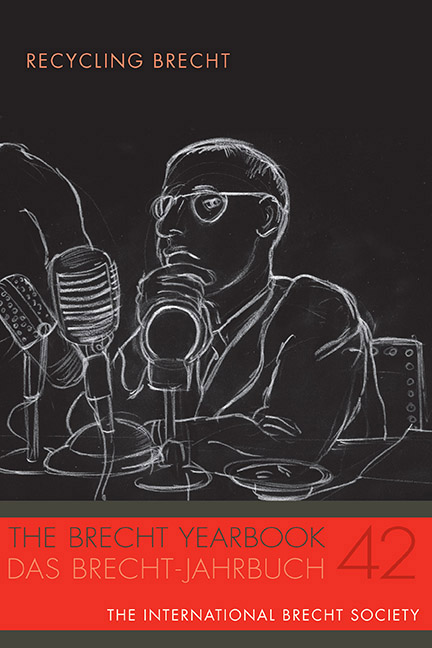A Future for the Lehrstück? Andres Veiel and Gesina Schmidt’s Der Kick and the Recycling of Form
Published online by Cambridge University Press: 09 April 2021
Summary
In a short piece written in 1937, Brecht turns his attention once again to the Lehrstücke—or learning plays—with which he had been busy until only a few years before. The note is important in understanding Brecht's innovative Lehrstücke for many reasons, including how they reconfigure the relationship between audience and actor and how these plays are to be performed. But the comment is particularly illuminating with regard to how Brecht conceives of the afterlife of this subgenre of his works: “Die Form der Lehrstücke ist streng, jedoch nur, damit Teile eigener Erfindung und aktueller Art desto leichter eingefügt werden können” (The form of the learning plays is strict, but only so that parts that one has come up with oneself or that are topical in nature can be integrated all the more easily). It is the form of these plays that is set in stone, but it is up to the director, should he or she so choose, to insert parts between these scenes. Above all else, Brecht's comment provides a compelling indication that he was aware not only that his plays could be reused and altered, but also that, in being reused and altered, their form would remain intact.
Given his conviction that the theater need respond to the changing shape of reality and social relations (see, for example: “Über Stoffe und Formen,” BFA 21, 302–4), Brecht conceived of a rigorously strong relationship between form and context in his thought and his works. His own efforts at restaging and revising his plays in his lifetime likewise demonstrate how he saw that even written texts would require adaptation to answer alterations in the dialectical composition of the world he inhabited. His Lehrstücke are no exception. These radical experimentations with form from the late 1920s and early 1930s were conceived and executed amid the struggle for a socialist future before the flourishing of Nazism in Germany. His alterations, no matter how light, to Der Lindberghflug (Lindbergh's Flight, 1929–30), culminating in his 1949–50 version of the text as Der Ozeanflug (The Flight Across the Ocean), are a case in point. And in the context of the establishment of a postwar socialist state in the German Democratic Republic (GDR), Brecht recognized that the Lehrstücke would once again be significant in using the theater as a political tool for overcoming the contradictions of a new social reality.
- Type
- Chapter
- Information
- The Brecht Yearbook / Das Brecht-Jahrbuch 42Recycling Brecht, pp. 171 - 186Publisher: Boydell & BrewerPrint publication year: 2018



